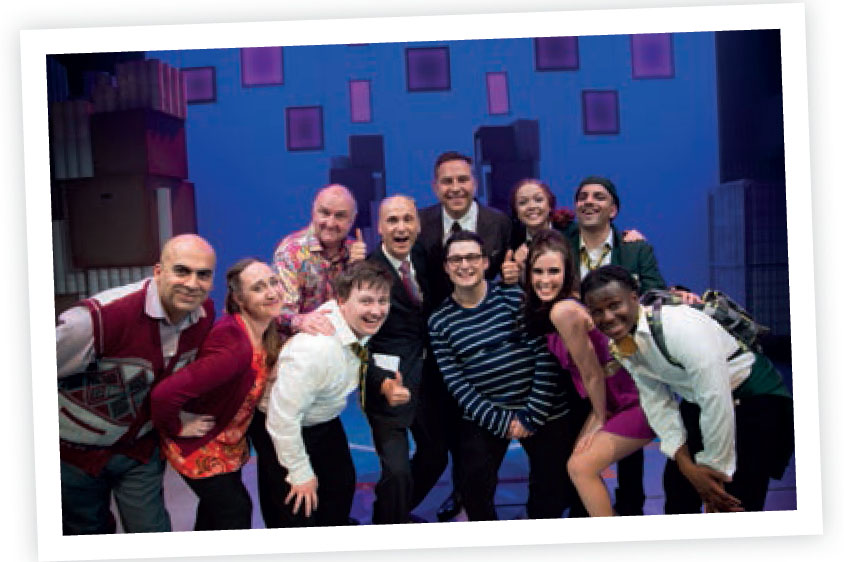
Neal Foster has been creating exciting children's theatre with the Birmingham Stage Company (BSC) since the 1980s when he decided to run a Christmas show unlike any around at the time and had huge success with an adaptation of The Fantastic Mr Fox. Since then, theatre for children has become the specialism of Foster and the company, to the huge delight of audiences (both younger and older) and critics.
I caught up with Foster, who together with the BSC is just about to embark on a run of his adaptation of David Walliams book for children, Billionaire Boy.
‘When we were putting on our productions in the 1980s we were literally one of the only companies doing it,’ Foster recalls, ‘and it proves how radically things have changed, with the RSC and the National, for example, now putting on children's theatre – and such high-quality theatre – which is great.’
Innovative and imaginative
Foster's mantra that inspired his leap into children's theatre and has guided him ever since is as follows: ‘if you want to be successful, don't try to be better, try to be different’ – the best business advice he says he's ever been given, and prophetically handed to him by his hairdresser!
Foster can keep being original due to the stimuli – children's stories old and new – which ‘are just so fantastic in the truest sense of the word.’ Foster reflects on how children's writers can take the reader on a journey with ‘extraordinary characters and stories’ and doesn't have to be bound by some realities to which adult dramas have to conform.
‘Children can handle highly sophisticated subjects; once above the age of about five they're interested in almost anything and I never feel you have to talk down to them’, says Foster, ‘the only requirement for children's stories is that you have to be really clear – but that doesn't mean making it simple.’
I was interested to know how Foster and the team choose their projects with so many amazing children's stories available.

© JACK SAIN
The cast with author David Walliams
He told me that it varies; sometimes the company are approached, sometimes they do the approaching. Often the projects will be inspired by what people in the company have experienced or read themselves, or heard other parents and children talking about; ‘the only criteria is I have to be really excited by it’, says Foster, ‘you know when you start it's going to be at least two years of your life.’
Each of the authors play a part in the projects as well, with each of them working in different ways with the BSC. In some cases – such as Walliams’ – they are very happy to let Foster and the company do all the adapting, ‘He gives you a lot of freedom’, says Foster, ‘he's really fantastic at giving notes, but sort of leaves you to it because he likes the process of watching someone else do something with his work.’ The company's production of Liz Pichon's Tom Gates was very different, with them working together directly to adapt her book for the stage version. ‘She was absolutely integral in terms of how the whole thing was created,’ and the same is true for the company's collaborations on their highly successful Horrible Histories adaptations.
Engaging young audiences
I asked Foster whether his approach to adapting and staging children's theatre has changed over the years in response to any change in children: ‘I've heard this whole theory about how children can't concentrate any more due to social media, and that seems to me to be utter rubbish. I sat in the audience last night with David Walliams for our adaptation of Billionaire Boy. The show is over two hours and the children are absolutely hooked.’ As we both commented – if it is of quality, the children will enjoy it and be focussed. ‘If we underestimate children and it's of poor quality, then they'll be bored within a few minutes.’
And of course, if children are bored in an audience, then they'll let you know: ‘the first performance of any new show we do is always terrifying, sitting among the audience to see if we are going to lose them at any point, but I find that very exciting – how you keep their interest.’ One top tip for keeping their interest that Foster shares is that ‘If the actors sit down, then children assume they are going to talk for a long time, and they can lose interest, so I have people stood up a lot. But that's the fun and the challenge – how do you encourage them to pay attention because it is going to be fun to listen.’
Billionaire Boy is on at the Bloomsbury Theatre in London from mid–December, before embarking on a tour in early 2020. To find out more and book visits, visit: https://www.ucl.ac.uk/event-ticketing/booking?ev=19005
